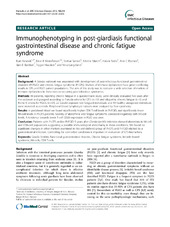| dc.contributor.author | Hanevik, Kurt | en_US |
| dc.contributor.author | Kristoffersen, Einar K. | en_US |
| dc.contributor.author | Sørnes, Steinar | en_US |
| dc.contributor.author | Mørch, Kristine | en_US |
| dc.contributor.author | Næss, Halvor | en_US |
| dc.contributor.author | Rivenes, Ann Christin | en_US |
| dc.contributor.author | Bødtker, Jørn | en_US |
| dc.contributor.author | Hausken, Trygve | en_US |
| dc.contributor.author | Langeland, Nina | en_US |
| dc.date.accessioned | 2013-05-14T10:32:22Z | |
| dc.date.available | 2013-05-14T10:32:22Z | |
| dc.date.issued | 2012-10-14 | eng |
| dc.Published | BMC Infectious Diseases 2012, 12:258 | eng |
| dc.identifier.issn | 1471-2334 | |
| dc.identifier.uri | https://hdl.handle.net/1956/6605 | |
| dc.description.abstract | Background: A Giardia outbreak was associated with development of post-infectious functional gastrointestinal disorders (PI-FGID) and chronic fatigue syndrome (PI-CFS). Markers of immune dysfunction have given conflicting results in CFS and FGID patient populations. The aim of this study was to evaluate a wide selection of markers of immune dysfunction in these two co-occurring post-infectious syndromes. Methods: 48 patients, reporting chronic fatigue in a questionnaire study, were clinically evaluated five years after the outbreak and grouped according to Fukuda criteria for CFS (n=19) and idiopathic chronic fatigue (n=5) and Rome II criteria for FGIDs (n=54). 22 Giardia exposed non-fatigued individuals and 10 healthy unexposed individuals were recruited as controls. Peripheral blood lymphocyte subsets were analyzed by flow cytometry. Results: In peripheral blood we found significantly higher CD8 T-cell levels in PI-FGID, and significantly lower NK-cell levels in PI-CFS patients. Severity of abdominal and fatigue symptoms correlated negatively with NK-cell levels. A tendency towards lower T-cell CD26 expression in FGID was seen. Conclusion: Patients with PI-CFS and/or PI-FGID 5 years after Giardia lamblia infection showed alterations in NK-cell and CD8-cell populations suggesting a possible immunological abnormality in these conditions. We found no significant changes in other markers examined in this well-defined group of PI-CFS and PI-FGID elicited by a gastrointestinal infection. Controlling for co-morbid conditions is important in evaluation of CFS-biomarkers. | en_US |
| dc.language.iso | eng | eng |
| dc.publisher | BioMed Central | eng |
| dc.relation.ispartof | <a href="http://hdl.handle.net/1956/15491" target="_blank">Post-giardiasis functional gastrointestinal disorders and chronic fatigue syndrome – clinical symptoms, inflammation and immune responses</a> | |
| dc.rights | Attribution CC BY | eng |
| dc.rights.uri | http://creativecommons.org/licenses/by/2.0/ | eng |
| dc.subject | Giardia lamblia | eng |
| dc.subject | Functional gastrointestinal disorder | eng |
| dc.subject | Chronic fatigue syndrome | eng |
| dc.subject | Irritable bowel syndrome | eng |
| dc.subject | NK cells | eng |
| dc.subject | CD8 T-cells | eng |
| dc.title | Immunophenotyping in post-giardiasis functional gastrointestinal disease and chronic fatigue syndrome | en_US |
| dc.type | Peer reviewed | |
| dc.type | Journal article | |
| dc.description.version | publishedVersion | en_US |
| dc.rights.holder | Copyright 2012 Hanevik et al.; licensee BioMed Central Ltd. | |
| dc.identifier.doi | https://doi.org/10.1186/1471-2334-12-258 | |
| dc.identifier.cristin | 997912 | |
| dc.source.journal | BMC Infectious Diseases | |
| dc.source.40 | 12 | |
| dc.source.14 | 258 | |

